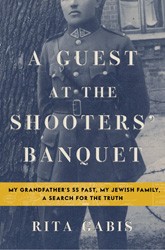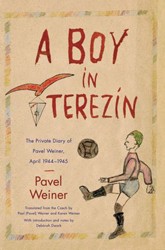Bernard and Winifred Schlesinger, born and bred in England, came of age in the era of Downton Abbey and lived to the 1980s in happy and comfortable circumstances. In their letters they sound as British as P. G. Wodehouse, chatting about what’s “awfully jolly” or “ripping,” but as Jews they can’t entirely fit in. Some jobs were closed to Bernard, a physician, and Winifred felt an “anxiety always to be on her best, never to stick out, to avoid embarrassment at all costs.”
“Bun” and “Win” began writing to each other during their courtship, and continued over Bernard’s service as a medic in both World Wars. Though he could have been an officer in World War I he served as an enlisted man, carrying out the wounded on stretchers in the midst of combat. Like his relatives who remained in Germany, Bernard wanted to show that his loyalty to his country was above suspicion; he went out of his way to do more than was asked.
Winnie made equally strenuous efforts, enrolling at the age of 18 in a course in First Aid so that she would qualify to be a nurse in the Voluntary Aid Detachment. She ended up in her own milieu, part of a mostly Jewish staff at a English convalescent home that encouraged its patients to spend time gardening and playing cricket. At the end of the war Winnie contracted influenza there, during the great epidemic that claimed fifty million lives.
Win knew that Bernard was the love of her life, and they finally became engaged in 1922 and married in 1925. This book is the work of their grandson Ian Buruma, the much admired essayist and novelist. Over the past 35 years he has written engagingly and idiosyncratically about love, history, culture, and marginal people across the globe. Their Promised Land touches on all those subjects, but most of all it is a love story: an epistolary romance that is less about falling in love than about sharing a life together in times of hope and periods of near-despair.
The Schlesingers were not religious. Their two sons had no bar mitzvah. Winnie’s brother Walter joined the Church of England. Their daughter Hilary converted to Roman Catholicism. Another daughter, Wendy — the mother of the author — married a Dutch Mennonite.
Like their neighbors, the Schlesingers enthusiastically celebrated Christmas — in a grandly Dickensian fashion, no less, complete with mistletoe, holly, stockings, and an immense tree heavy with ornaments. Yet Win and Bun, adhering to no particular faith, never contemplated abandoning their Jewish identity.
Antisemitism often reminded them who they were. After completing his studies at Cambridge, Bernard applied for a job at Great Ormond Street Hospital in London, and was given a non-permanent position “in spite of an anti-Semitic intrigue.” Years later, when he failed to get a better position at St. Thomas’s Hospital, Bernard concluded that the obstacle was the same: “It is the old, old story. The senior job is not for me at any price.”
Nonetheless they felt pride in their origins and their class. And despite the social cost of being overtly Jewish in mid-century Britain, Bun and Win took a decisive step of breathtaking courage and generosity: they saved and housed 12 Jewish children from Nazi Germany. For Buruma, those children were virtually members of his extended family, and he follows the course of their lives. Many years later, he recalls, pictures of Bernard and Win were still displayed in their homes.
The Second World War’s impact on ordinary people can be glimpsed through the Schlesingers’ experiences. The dislocations and privations of wartime Britain are evident in Win’s letters and those of her children, who were sent to the countryside to avoid the Blitz. News trickled out of Germany in letters from relatives that spoke of friends and family being deported to the east. Bernard meanwhile was posted to hospitals in India during the last years of the war, where — though Americans may not remember — three million Bengalis perished of famine in 1943.
Their Promised Land is many things: a history of its times, an extended personal essay, a consideration of the Jewish condition in the first half of the twentieth century, a love story, and a vivid depiction of the far-flung places where Bernard’s military service took him. Above all, though, it is a devoted tribute to the author’s beloved grandparents. “Bernard and Win’s marriage set an almost impossible standard,” he concludes. “I loved them.”
Related Content:
Interview with Ian Buruma
InTheir Promised Land, Ian Buruma tells the extraordinary story of his own grandparents: British Jews who were apart during the World Wars and stayed in touch by writing letters across the distances that separated them. His book is part history, part memoir, part love story.
Bob Goldfarb: When did your grandparents’ letters first come into your hands?
Ian Buruma: The first time I read some of them was in 1999, when I was working on Anglomania,a book about European Anglophilia in the United States. I knew where the letters were — in a family archive, in a barn, in a country house that belonged to one of my uncles. I thought for a long time that it would make a book of some kind. But it was only a year or two ago that I brought them to America.
BG: What prompted you to make this a book?
IB: I thought the material was very rich and told a story, not just about them but also about the history of the twentieth century. A novel came to mind, but I felt that would be a waste of the material, because the letters themselves are so interesting. Simply editing my grandparents’ correspondence was also not quite the way, either. So I had to feel my way towards a form, and the idea came to me around the early 2000s.
BG: You seem to have a particular interest in the world as it was just before you came into it.
IB: When you think of families of people my age, there are families where the parents had experiences of World War II. In some families it was never spoken about, partly because it was too painful for the parents, or because they children weren’t interested. For me that was never the case; I was always interested. Adults in my family would talk, from when I was a boy. So, yes, I was always interested in that. I don’t know why. Perhaps it’s because it was so frightening that a world that seemed so settled, like Europe after World War I, could suddenly erupt in a kind of nightmarish hell.
BG: Your grandparents seem to have been aggressively assimilated into the larger culture in which they lived. Can we draw conclusions today from the lives they lived then?
IB: They came from a tradition that had been assimilationist since at least the eighteenth century. So their grandparents would no longer have lived in the Judengasse in Frankfurt where the family lived originally. They had been very German already, one of those families that had a history of living in Germany longer than most so-called “native” Germans. My grandparents were following in that tradition even though they were British rather than German.
As you know, a lot of this has to do with class. The more people move up and become prosperous, the more they let go of the culture of the old country. They are very much a manifestation of that — not just them, but also their parents. To me one of the most interesting passages from Their Promised Land is the exchange between my great-uncle and Franz Rosenzweig. Rosenzweig was so impressed by the Polish Jews he met during World War I — he felt they were more at ease in their skin because they had a clearer sense of who they were.
BG: Your grandparents defined themselves largely in terms of culture, especially classical music. What was there about classical music in particular?
IB: So many German Jews loved Wagner. To worship at the shrine of Bayreuth was to take part in a kind of mystical sense of being German without having to be Christian.
The other thing is, it’s easy to see why German culture dovetailed with a certain Jewish experience. The Germans didn’t have a state of their own until very late, and they had to distinguish themselves from the rationalism of France and French philosophy. The reason that music can play such a powerful role is that it’s abstract, so you can feel you’re taking part in a high culture almost in a religious way, without converting to a faith. My grandparents were part of that tradition, where classical music defined you as a person of high culture.
BG: Did you ever feel you were intruding when you were reading their letters?
IB: Yes, of course. I would never have dreamed of doing this if they’d still been alive. But I do feel that once people are gone, and their experience — even their intimate lives — are of historical interest, then it’s legitimate to let it be known. I made very sure that my aunt, the last surviving member of my mother’s generation, read it, so that I wouldn’t do it behind their backs. My main concern was not so much what they would have thought, because they are no longer there, but rather to make sure I didn’t hurt those who are still alive.
It’s very interesting when you are writing about family, people who are close to you. It’s always very difficult, because others who felt equally close to them will have a slightly different picture. It’s very rare that you can do something like this and please one’s siblings, or people who were also close, because it’s not necessarily the image they have. The greatest skepticism has come from people who knew them — from my sister, and my father, and so on.
BG: You’re not afraid at some points to talk about events that were personal, even personally embarrassing episodes about yourself.
IB: I don’t think they were embarrassing because it was a long time ago. Once something becomes a story, it’s not like a confession — and I’m not by nature a confessional person. I’ve just finished reading a memoir written by Stephen Spender’s son about his parents, and he goes into the sex lives of his parents, and his own. I could never do that. I could never imagine wanting to do that.
BG: Do you find writing a story like this very different from writing fiction?
IB: Yes, because you don’t have to make anything up! The structure here is still slightly novelistic; it is a way of telling a story. But I do find it easier applying a certain novelistic technique to something that is factually true than to making up a story.
Bob Goldfarb is Director of Institutional Affairs at the Forward. He lives in New York.
Related Content:
- Sarah Wildman: Paperless Love: An Unsettling Departure
- If a Place Can Make You Cry by Daniel Gordis
- Miranda Richmond Mouillot: How to Ask?
Bob Goldfarb is President Emeritus of Jewish Creativity International.




